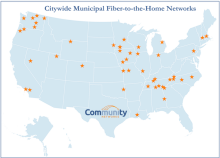Tennessee Muni Rates Fact Sheet
In addition to studying how and where local communities examine the potential for publicly owned Internet networks, we’ve looked at rates over time in select areas of the country. We recently put together a comparison of historical rates for municipal networks in Tennessee. Our findings are consistent with what we’ve seen all over the country - publicly owned networks don't hesitate to raise speeds while keeping rates affordable. We've documented the data on our fact sheet: Municipal Networks: Speed Increases & Affordable Prices.
Not Like The Big Guys
National providers make it a habit to periodically raise rates and over time those increases add up. They’ve done it so often, subscribers have come to expect it on a regular basis. Price increases don’t usually include a speed increase. With no need to appease shareholders, officials in charge of publicly owned networks can set rates at a level that allow a network to be sustainable rather than rates that maximize profits.
Publicly owned networks have increased speeds for subscribers, often with little or no fanfare other than quietly alerting subscribers to their improved service. Places Chattanooga’s EPB, Morristown’s FiberNET, and BET in Bristol are in a much different habit than Comcast or AT&T - they increase speeds with no increase in price. Other Tennessee communities have increased speeds significantly with only slight price increases over years of service.
Speeds, Rates Then And Now
On our fact sheet, we include prices for the basic tiers now and when the network began offering services. We also compare the basic speeds when the network began serving the community and today. The results reflect how publicly owned networks focus on providing fast, affordable connectivity to subscribers rather than collecting profit from customers.
Some results may surprise you:






